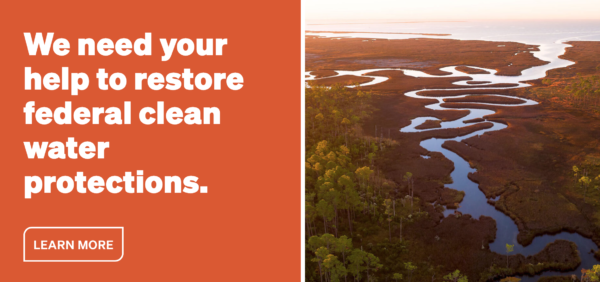For immediate release
Contacts: Kathleen Sullivan, 919-945-7106, ksullivan@selcnc.org
Tasha Durrett, 571-405-1101, tdurrett@selcva.org
CHAPEL HILL, N.C. — This month the North Carolina Office of Administrative Hearings upheld the state’s decision allowing Smithfield-owned hog operations to use giant pits of untreated hog feces and urine to produce gas while spraying the harmful waste on surrounding areas, which continues a long history of water pollution and harm to the families – disproportionately Black, Latino, and Native American – living nearby.
The four permits authorize hog operations to use a dangerous and polluting lagoon and sprayfield system for their hog waste; the process of producing and collecting gas from the waste lagoons can actually make the waste more polluting. Ammonia emissions from open hog waste pits in Duplin and Sampson Counties are already responsible for scores of premature deaths every year, according to a study published by the National Academy of Sciences.
“While we are disappointed in the decision, our organization remains committed to pursuing clean water, clean air, and environmental justice for residents of eastern North Carolina that have borne the burden of pollution from these hog operations for decades,” said Maggie Galka, vice chair of the board for Environmental Justice Community Action Network (EJCAN).
“These hog operations pollute our waterways and put people nearby and downstream at risk, and we are disappointed to see what amounts to a green-light for this industry’s continued pollution,” said Kemp Burdette, the Cape Fear Riverkeeper.
“Smithfield is using cleaner, more modern technology in other states to produce gas while reducing pollution, and North Carolina’s communities are entitled to the same protections,” said Blakely Hildebrand, attorney with the Southern Environmental Law Center. “Smithfield must stop its pollution and continued environmental injustices rather than consistently using the cheapest, most harmful methods to handle hog sewage in North Carolina. The law requires it.”
Earlier this year, on behalf of the Environmental Justice Community Action Network and Cape Fear River Watch, SELC challenged the four state permits saying DEQ violated state law when the agency failed to require less harmful alternatives for producing gas from hog waste and failed to address cumulative effects of water pollution from these and other industrial hog operations and agricultural operations in the Cape Fear River Basin. In issuing this permit, DEQ violated its responsibility to prevent water pollution, and, instead, entrenches it without requiring better waste management to protect North Carolina’s waterways and communities.
###
The Southern Environmental Law Center is one of the nation’s most powerful defenders of the environment, rooted in the South. With a long track record, SELC takes on the toughest environmental challenges in court, in government, and in our communities to protect our region’s air, water, climate, wildlife, lands, and people. Nonprofit and nonpartisan, the organization has a staff of 170, including 90 attorneys, and is headquartered in Charlottesville, Va., with offices in Asheville, Atlanta, Birmingham, Chapel Hill, Charleston, Nashville, Richmond, and Washington, D.C.
If you would rather not receive future communications from Southern Environmental Law Center, let us know by clicking here.
Southern Environmental Law Center, 1 Randolph St, Chicago, IL 60601 United States




